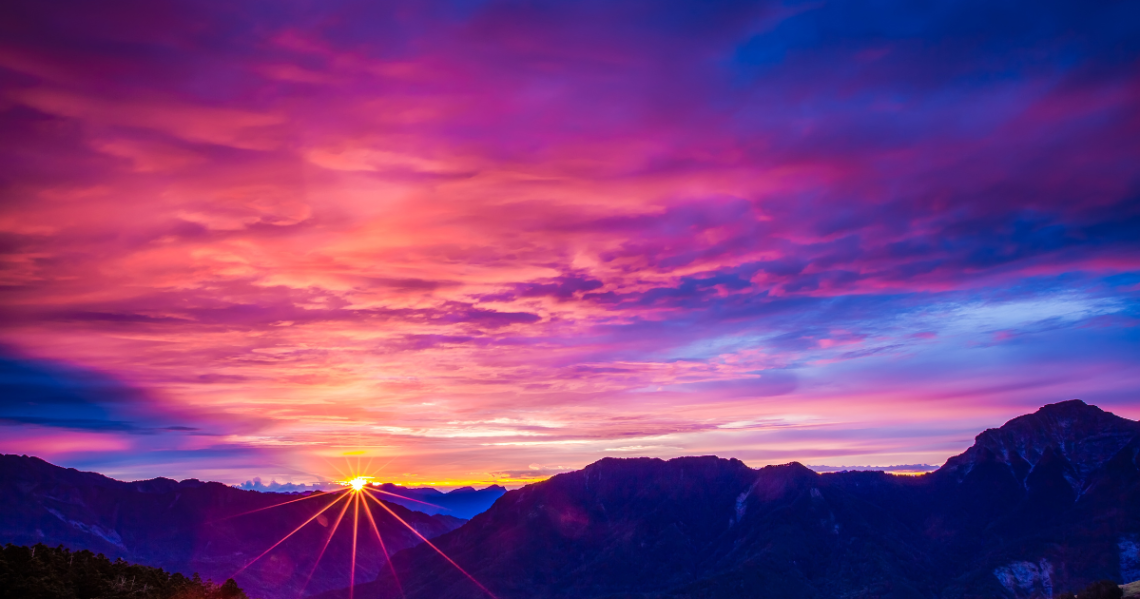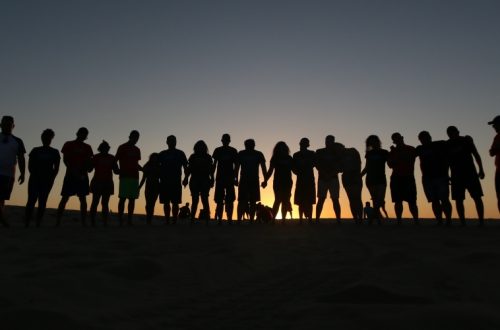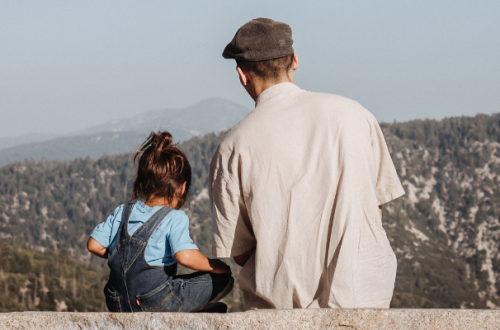
Beauty, Nature, and Anxiety
I found myself considering beauty, nature, and anxiety this week, because we just finished a spectacular regional display of fall leaves in every color. I thought I’d share some of my thoughts with you and see if you agree.
On the heels of a miserable summer—it got too hot too early, rarely rained, and just about every plant and tree in my yard struggled with bugs and fungus and mildews because of the weather—we just saw the peak of one of the most beautiful falls I can remember. The reds were spectacular. The oranges were vivid. More than once in the past week I had to scold myself for not watching the road because I was rubbernecking to see all the trees.
I was thinking about my reaction to trees, my reaction to beauty in nature and beauty in general, and it got me thinking about God and His love for me.
Beauty in the natural world is a gift
God didn’t have to make the world beautiful. He didn’t have to give us sights to take our breaths away. In fact, not only did he give us the sights, but I think he gave us the eyes to see them, eyes that recognize beauty. Why do I think a mountain or a lake or a fall tree is beautiful? What purpose did God have for giving me this innate love of his created world? And why do landscapes seem to soothe my anxious soul?
Moreover, why do so many of us feel this way? If you look at photographs of beautiful places, you see that people in every culture and every corner of the world agree on the beauty of nature and try to capture it. We do it with cameras, with art, with written words. Wealthy people throughout time have created huge, wonderful gardens to bring some of the majesty of the created world closer to home.
I did a study on mental health and landscapes. Surprise, surprise, being in nature reduces anxiety and stress levels. Our bodies relax and heal and feel better if we are exposed to nature. There is a scientific tie between beauty, nature, and anxiety and all kinds of health issues.
We were made to participate in the natural world, and a loving God gave us an appreciation to go along with that. He also made us so our worksite benefits us both body and mind.
The Japanese practice something best translated as forest bathing, which essentially is being in nature for the sake of mindfully slowing down and enjoying nature. Now there’s an entire branch of therapies based on the practice of being in forests and other outdoor locales. According to one forest therapy website (and this site is a little New Age, so be warned), benefits of forest therapy include boosted immune function, improved cardiovascular and respiratory health, attention restoration, and a reduction in stress and depression.
According to Genesis, we were made to participate in the natural world, and a loving God gave us an appreciation of that world to go along with it. He also made us so our worksite benefits us both body and mind. How cool is that? God thinks of everything.
The natural world is an altar call
If you open the Bible, these findings aren’t such a surprise. Check out the beginning of Psalm 19:
The heavens declare the glory of God.
The expanse shows his handiwork.
Day after day they pour out speech,
and night after night they display knowledge.
There is no speech nor language,
where their voice is not heard.
Their voice has gone out through all the earth,
their words to the end of the world.
In them he has set a tent for the sun,
which is as a bridegroom coming out of his room,
like a strong man rejoicing to run his course.
His going out is from the end of the heavens,
his circuit to its ends.
There is nothing hidden from its heat.
And of course, we see God’s care in the beginning as He made it and told us what to do with it:
God blessed them and said to them, “Be fruitful and increase in number; fill the earth and subdue it. Rule over the fish in the sea and the birds in the sky and over every living creature that moves on the ground.” Now the LORD God had planted a garden in the east, in Eden; and there he put the man he had formed. The LORD God made all kinds of trees grow out of the ground—trees that were pleasing to the eye and good for food. In the middle of the garden were the tree of life and the tree of the knowledge of good and evil. The LORD God took the man and put him in the Garden of Eden to work it and take care of it. Genesis 1:28, 2:8-9, 15
Finally, Paul weighs in in Romans 1:20:
For since the creation of the world God’s invisible qualities—his eternal power and divine nature—have been clearly seen, being understood from what has been made, so that people are without excuse.
God made everything. He declared it good, and while it was corrupted with sin, it still speaks clearly enough that Paul says nature creates a natural curiosity about the Creator that cannot be denied. In our deepest core we recognize the divine fingerprints in the world. This is the connection between nature and anxiety–the Creator Himself made us to find healing in the world He made for us.
Let me be careful here, especially in light of the forest therapy website and others like it. God isn’t nature, and nature isn’t divine. God is above it. He created it. We don’t bow to it, worship it, or give it a higher place than it deserves. However, creation says a whole lot about who God is the way all art speaks of the artist. We cannot help but put something of our natures in our work, and that started with God.
Personal experience
Six years ago my family moved out of a suburban/urban area into the country. I look out my front window and see cows and sheep. Vultures and geese and herons fly over all the time. Sometimes deer visit. I live on a hill, so the sky is huge—I had no idea how much the sun moves in the sky with the seasons and how much the moon doesn’t. I didn’t realize those photos of super-starry nights were real. The Milky Way is truly visible on clear, moonless nights.

And I find it very peaceful out here. When I go out with the dogs in the morning and stand in my yard, the world is quiet. I hear the neighbor donkey, chickens, the occasional cow, and little else. Sometimes I see fog, migrating birds, rainbows, and storm clouds.
And I observe it. I breathe it in. I feel the tension of the world recede. Not because it’s magical or mystical, but because God made this world for his humans. He made it with love and care and gave us the ability to find healing when we participate in it. We are meant to be here, to cultivate and care for His creation, and the perk of that original job description is that we are hardwired to find the natural world fulfilling.
When landscapes aren’t beautiful
It makes me wonder about those who never see nature. We talk about urban crime in terms of poverty and education and generational oppression and other factors, and I’m sure those things are true. But what if some of it is simply being cut off from God’s creation? Many of us are a long, long way from caring for the natural world. God made it for us, gave us standards of beauty based on that world, and told us to take care of it.
Someone in a high-rise urban apartment in a run-down city with no landscaping is as far from the ideal of God’s original plans for us as possible. Not necessarily by choice or in a sinful way, but because the world is broken. Maybe that distance from the natural world takes a toll. Maybe then the relationship between beautiful nature and anxiety is clear, and lack of one can cause the other.
After almost crashing my car for the second time this fall, I decided to research beautiful landscapes and mental health, because the trees were healing things I hadn’t realized were broken. What I discovered is that urban planners worldwide are realizing the importance of nature in our cities. Parks, city trees, community gardens… People are catching on to the fact that natural beauty is healthy, and we are more likely to thrive when we see it than if we don’t.
Fake nature–it works!
Most startling was that even images of landscapes reduce stress. Researchers showed over-stressed people images of urban areas with trees and urban areas with nothing green, and the simple, not majestic images of urban trees calmed people. It doesn’t have to be real or represent the most majestic images of creation. We respond to anything alive.
I wrote a prayer book that is full color and filled with natural landscape images, because I’ve felt for a long time that looking at nature images makes me calmer. I post landscape images on social media. My business cards for this website—yep, they have landscape images. I’m not surprised by the researcher’s finds because that very thing has worked for me for a long time. However, I’m partial to sunrises. I love a good sunrise photo.
And if we can see it up close? Smell it, hear it, taste the salt of the ocean or the special tang of spring when pollen is everywhere? If even images heal us, how much better is full-sensory reality for the anxious or stressed-out soul?
A few conclusions
So, what have we concluded? God made the world for us and let us see its beauty. It isn’t God in itself, but it reflects Him enough that we have no excuse not to think about divinity and the Creator when we see it.
We are tied to it. God told to care for it, and because He loves us, He gave us (this is the general us, not every single person) the ability to appreciate it. What a great gift to give us a love for the job He meant for us to do.
As we lose touch with it, we are becoming a people with more and more violent tendencies, mental health issues, and general despair. Since studies show nature can help cure it, maybe lack of nature played a role in causing it.
Not everyone can move to the country. So what are some practical ways we can take advantage of God’s gift of the healing of the natural world if we can’t get there? Here are some things researchers say have similar effects:
- Potted houseplants
- Photos of landscapes
- Artistic representations of landscapes
- Visits to city parks
- Gardens of all sorts, even a couple pots of herbs at the back door
- City gardens
I keep plants on my windowsill in the winter. I have no green thumb for houseplants, so they rarely survive past a couple seasons, but they get me through until the natural world wakes up again. And of course, every season has its beauty. Not on this list is simply driving through wilder areas. Maybe it’s time to resurrect the old habit of the Sunday Drive with someplace beautiful as the destination.
Back to the Bible
Here are a few more verses about the natural world. David, especially, seemed to find it healing. Of course, he spent seven years hiding in the wilderness after growing up as a shepherd, so he was closer than some. And God’s promises for a beautiful future for His people—like in Isaiah–often include special consideration for his creation.
You care for the land and water it;
you enrich it abundantly.
The streams of God are filled with water
to provide the people with grain,
for so you have ordained it.
You drench its furrows and level its ridges;
you soften it with showers and bless its crops.
You crown the year with your bounty,
and your carts overflow with abundance.
The grasslands of the wilderness overflow;
the hills are clothed with gladness.
The meadows are covered with flocks
and the valleys are mantled with grain;
they shout for joy and sing. Psalm 65:9-13
He covers the sky with clouds;
he supplies the earth with rain
and makes grass grow on the hills.
He provides food for the cattle
and for the young ravens when they call. Psalm 147:8-9
The desert and the parched land will be glad;
the wilderness will rejoice and blossom.
Like the crocus, it will burst into bloom;
it will rejoice greatly and shout for joy. Isaiah 35:1-2
How does the natural world affect you? Do you find peace or healing in the wide open places, in gardens, or even through a photograph? I’d love to hear your take on the importance of nature to mental health.




